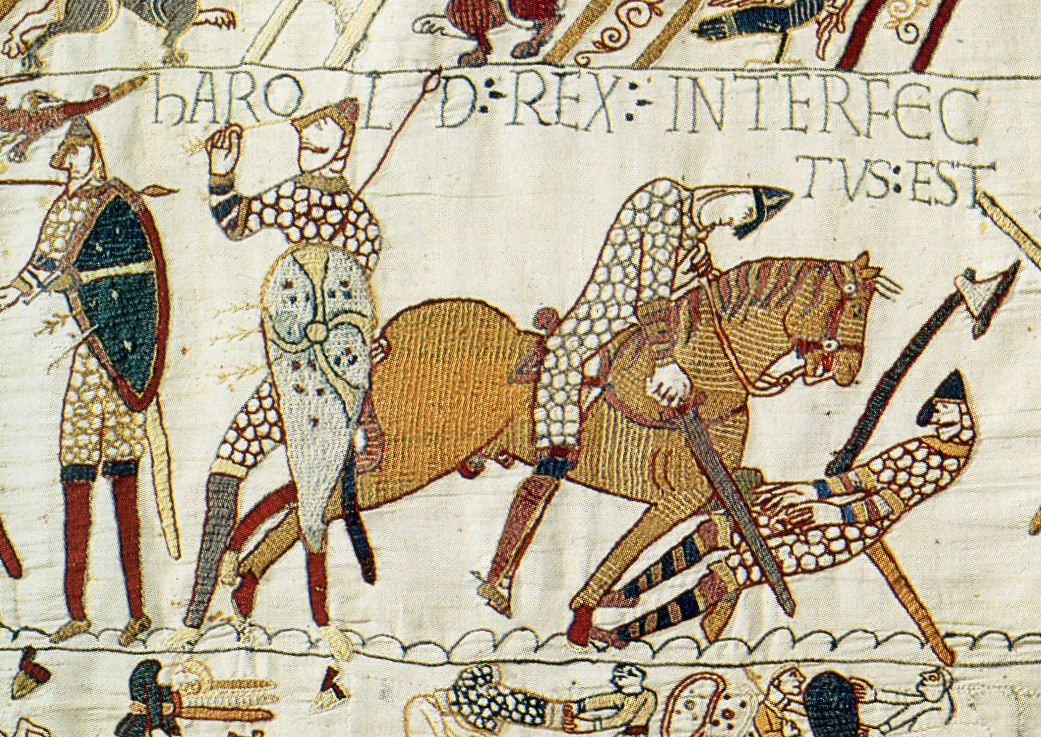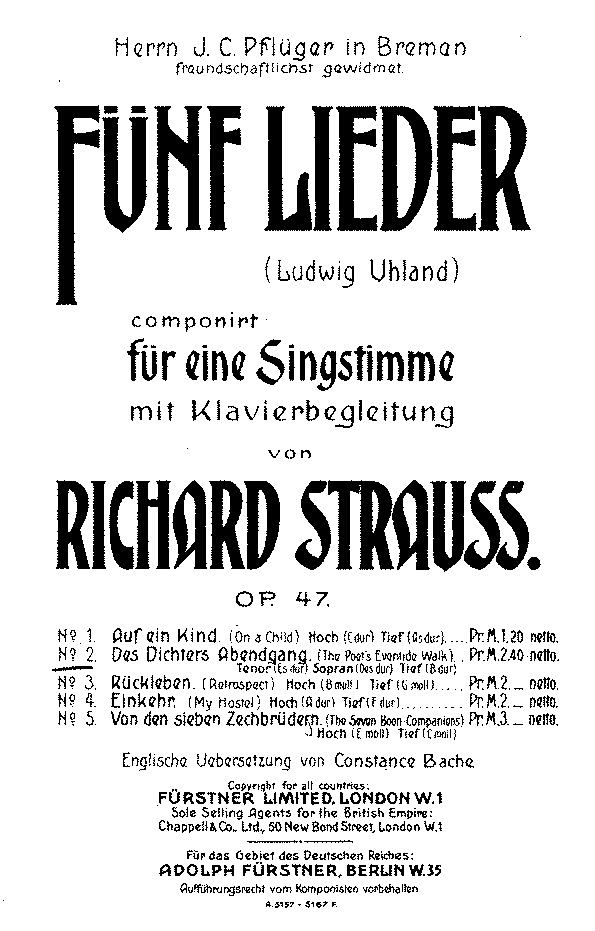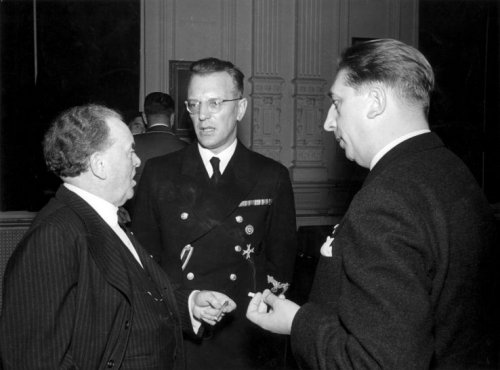|
Taillefer (Strauss)
''Taillefer'', Op. 52, TrV 207, is a cantata for choir and orchestra composed by Richard Strauss in 1903. The text is a rendering of the medieval tale Taillefer by the German poet Ludwig Uhland (1787–1862). The piece was written to celebrate the centenary of Heidelberg University and was premiered on the same day that Strauss received his honorary doctorate from the university, on 26 October 1903 in the newly built Heidelberg Town Hall with Strauss conducting. It is written for a mixed chorus with three soloists, tenor (Taillefer), baritone ( Duke William of Normandy), and soprano (the Duke's daughter and admirer of Taillefer), with a large orchestra. The work was performed at the last night of The Proms in 2014. Composition history Taillefer is the hero of a romantic medieval tale set in the court of Duke William of Normandy (William the Conqueror) around the time of the invasion of England and the Battle of Hastings in 1066. Strauss used the version in a poem by Ludwig Uhla ... [...More Info...] [...Related Items...] OR: [Wikipedia] [Google] [Baidu] |
Cantata
A cantata (; ; literally "sung", past participle feminine singular of the Italian verb ''cantare'', "to sing") is a vocal composition with an instrumental accompaniment, typically in several movements, often involving a choir. The meaning of the term changed over time, from the simple single-voice madrigal of the early 17th century, to the multi-voice "cantata da camera" and the "cantata da chiesa" of the later part of that century, from the more substantial dramatic forms of the 18th century to the usually sacred-texted 19th-century cantata, which was effectively a type of short oratorio. Cantatas for use in the liturgy of church services are called church cantata or sacred cantata; other cantatas can be indicated as secular cantatas. Several cantatas were, and still are, written for special occasions, such as Christmas cantatas. Christoph Graupner, Georg Philipp Telemann and Johann Sebastian Bach composed cycles of church cantatas for the occasions of the liturgical year. ... [...More Info...] [...Related Items...] OR: [Wikipedia] [Google] [Baidu] |
Des Dichters Abendgang
"Des Dichters Abendgang" ("The Poets Evening Stroll") is an art song composed by Richard Strauss using the text of a poem with the same name by Ludwig Uhland (1787–1862), the second in his Opus 47 collection, (TrV 200) which was published in 1900. Originally written for piano and voice, Strauss wrote an orchestral version in 1918. Composition history Strauss wrote the song at his home in Charlottenburg near Berlin, completing it on May 8, 1900. Strauss set five of Uhlands's poems in his Opus 47 songs. He had only recently set another Uhland poem ''Die Ulme zu Hirsau'' (opus 43/3, 1899). The poet had also been a childhood favourite of Strauss: two of his earliest ''Jugendlieder'' (childhood songs) written in 1871 were Uhland settings. Strauss' tempo marking is "Sehr ruhig and feierlich" (very quiet and solemn) and his setting "is a full scale heroic song, originally composed in Strauss' heroic key of E flat". The song was published in a bilingual edition with English lyrics the ... [...More Info...] [...Related Items...] OR: [Wikipedia] [Google] [Baidu] |
Flute
The flute is a family of classical music instrument in the woodwind group. Like all woodwinds, flutes are aerophones, meaning they make sound by vibrating a column of air. However, unlike woodwind instruments with reeds, a flute is a reedless wind instrument that produces its sound from the flow of air across an opening. According to the instrument classification of Hornbostel–Sachs, flutes are categorized as edge-blown aerophones. A musician who plays the flute is called a flautist or flutist. Flutes are the earliest known identifiable musical instruments, as paleolithic examples with hand-bored holes have been found. A number of flutes dating to about 53,000 to 45,000 years ago have been found in the Swabian Jura region of present-day Germany. These flutes demonstrate that a developed musical tradition existed from the earliest period of modern human presence in Europe.. Citation on p. 248. * While the oldest flutes currently known were found in Europe, Asia, too, has ... [...More Info...] [...Related Items...] OR: [Wikipedia] [Google] [Baidu] |
SATB
SATB is an initialism that describes the scoring of compositions for choirs, and also choirs (or consorts) of instruments. The initials are for the voice types: S for soprano, A for alto, T for tenor and B for bass. Choral music Four-part harmony using soprano, alto, tenor and bass is a common scoring in classical music, including chorales and most Bach cantatas.Shrock, DennisChoral Repertoire''Oxford University Press'', 2009, p. 298, The letters of the abbreviation are also used by publishers to describe different scorings for soloists and choirs other than four-part harmony. For example, the listing "STB solos, SATB choir", of Bach's ''Wachet auf, ruft uns die Stimme'', BWV 140, indicates that a performance needs three soloists: soprano, tenor and bass, and a four-part choir. "SATB/SATB" is used when a double choir is required, as in Penderecki's ''Polish Requiem''. or SSATB, with divided sopranos, which is a typical scoring in English church music. A listing for Bach's ''M ... [...More Info...] [...Related Items...] OR: [Wikipedia] [Google] [Baidu] |
Willem Mengelberg
Joseph Wilhelm Mengelberg (28 March 1871 – 21 March 1951) was a Dutch conductor, famous for his performances of Beethoven, Brahms, Mahler and Strauss with the Concertgebouw Orchestra in Amsterdam. He is widely regarded as one of the greatest symphonic conductors of the 20th century. Biography Mengelberg was the fourth of fifteen children of German-born parents in Utrecht, Netherlands. His father was the Dutch-German sculptor Friedrich Wilhelm Mengelberg. After studies in Utrecht with the composer and conductor Richard Hol, the composer Anton Averkamp (1861–1934) and the violinist Henri Wilhelm Petri (1856–1914), he went on to study piano and composition at the Cologne conservatory (now the Hochschule für Musik Köln), where his principal teachers were Franz Wüllner, Isidor Seiss and Adolf Jensen. In 1891, when he was 20, he was chosen as General Music Director of the city of Lucerne Switzerland, where he conducted an orchestra and a choir, directed a music school, tau ... [...More Info...] [...Related Items...] OR: [Wikipedia] [Google] [Baidu] |
Concertgebouw, Amsterdam
The Royal Concertgebouw ( nl, Koninklijk Concertgebouw, ) is a concert hall in Amsterdam, Netherlands. The Dutch term "concertgebouw" translates into English as "concert building". Its superb Architectural acoustics, acoustics place it among the finest concert halls in the world, along with Boston's Symphony Hall, Boston, Symphony Hall and the Musikverein in Vienna. In celebration of the building's 125th anniversary, Beatrix of the Netherlands, Queen Beatrix bestowed the royal title "Koninklijk" upon the building on 11 April 2013, as she had on the Royal Concertgebouw Orchestra upon its 100th in 1988. History The architect of the building was , who was inspired by the Gewandhaus in Leipzig, built two years earlier (and destroyed in 1943). Construction began in 1883 in a pasture that was then outside the city, in Nieuwer-Amstel, a municipality that in 1964 became Amstelveen. A total of 2,186 wooden piles, twelve to thirteen metres (40 to 43 ft) long, were emplaced in the so ... [...More Info...] [...Related Items...] OR: [Wikipedia] [Google] [Baidu] |
Gustav Mahler
Gustav Mahler (; 7 July 1860 – 18 May 1911) was an Austro-Bohemian Romantic composer, and one of the leading conductors of his generation. As a composer he acted as a bridge between the 19th-century Austro-German tradition and the modernism of the early 20th century. While in his lifetime his status as a conductor was established beyond question, his own music gained wide popularity only after periods of relative neglect, which included a ban on its performance in much of Europe during the Nazi era. After 1945 his compositions were rediscovered by a new generation of listeners; Mahler then became one of the most frequently performed and recorded of all composers, a position he has sustained into the 21st century. Born in Bohemia (then part of the Austrian Empire) to Jewish parents of humble origins, the German-speaking Mahler displayed his musical gifts at an early age. After graduating from the Vienna Conservatory in 1878, he held a succession of conducting posts of rising ... [...More Info...] [...Related Items...] OR: [Wikipedia] [Google] [Baidu] |
Allgemeine Zeitung
The ''Allgemeine Zeitung'' was the leading political daily journal in Germany in the first part of the 19th century. It has been widely recognised as the first world-class German journal and a symbol of the German press abroad. The ''Allgemeine Zeitung'' ( ‘general newspaper’) was founded in 1798 by Johann Friedrich Cotta in Tübingen. The works of Schiller and Goethe were published on its pages. After 1803, the journal was published in Stuttgart. From 1807 to 1882, it was published in Augsburg. Heinrich Heine was a major contributor to the journal. From 1831 he wrote reports on music and painting and became the newspaper's Parisian correspondent. He wrote articles on the French way of life but also about Louis-Philippe and German politics. In 1882, the ''Allgemeine Zeitung'' moved to Munich. The journal stopped publishing on 29 July 1929. The tradition of this major journal is still maintained by the ''Augsburger Allgemeine Zeitung'', ''Frankfurter Allgemeine Zeit ... [...More Info...] [...Related Items...] OR: [Wikipedia] [Google] [Baidu] |
Otto Julius Bierbaum
Otto Julius Bierbaum (28 June 1865 – 1 February 1910) was a German writer. Bierbaum was born in Grünberg, Silesia. After studying in Leipzig, he became a journalist and editor for the journals ''Die freie Bühne'', ''Pan'' and '' Die Insel''. His literary work was varied. As a poet he used forms like the ''Minnesang'' or the folksong and the Anacreontics style. In 1897 Bierbaum published his novel ''Stilpe'' which inspired Ernst von Wolzogen to establish, in 1901, the first cabaret venue ever in Berlin, the ''Überbrettl'' . His novel ''Zäpfel Kerns Abenteuer'' was an adaptation of Carlo Collodi's ''Pinocchio''. Bierbaum's final novel, ''Yankeedoodlefahrt'', was published in 1909 and is the source of the winged words "''Humor ist, wenn man trotzdem lacht''" ("Humor is when you laugh anyway"), which has become a proverb in modern German. Bierbaum died at Kötzschenbroda near Dresden. Works * ''Erlebte Gedichte'' (1892) ** "Traum durch die Dämmerung" * ''Die Schlangendam ... [...More Info...] [...Related Items...] OR: [Wikipedia] [Google] [Baidu] |
Ein Heldenleben
''Ein Heldenleben'' (''A Hero's Life''), Op. 40, is a tone poem by Richard Strauss. The work was completed in 1898. It was his eighth work in the genre, and exceeded any of its predecessors in its orchestral demands. Generally agreed to be autobiographical in nature despite contradictory statements on the matter by the composer, the work contains more than thirty quotations from Strauss's earlier works, including ''Also sprach Zarathustra'', ''Till Eulenspiegel'', ''Don Quixote'', ''Don Juan'', and ''Death and Transfiguration''. Background Strauss began work on the piece while staying in a Bavarian mountain resort in July 1898. He proposed to write a heroic work in the mould of Beethoven's ''Eroica'' Symphony: "It is entitled 'A Hero's Life', and while it has no funeral march, it does have lots of horns, horns being quite the thing to express heroism. Thanks to the healthy country air, my sketch has progressed well and I hope to finish by New Year's Day."Glass, Herbert''Ein ... [...More Info...] [...Related Items...] OR: [Wikipedia] [Google] [Baidu] |
Norman Del Mar
Norman René Del Mar CBE (31 July 19196 February 1994) was a British conductor, horn player, and biographer. As a conductor, he specialised in the music of late romantic composers; including Edward Elgar, Gustav Mahler, and Richard Strauss. He left a great legacy of recordings of British music, in particular Elgar, Ralph Vaughan Williams, Frederick Delius, and Benjamin Britten. He notably conducted the premiere recording of Britten's children's opera ''Noye's Fludde''. Life and career Born in Hampstead, London, Del Mar began his career as a horn player. He was one of the original members of the Royal Philharmonic Orchestra (RPO), which was established by Sir Thomas Beecham in 1946. Within the first few months of the RPO's existence, Beecham appointed Del Mar as his assistant conductor. Del Mar made his professional debut as a conductor with the RPO in 1947. In 1949 Del Mar was appointed principal conductor of the English Opera Group, in which post he remained until 1954. I ... [...More Info...] [...Related Items...] OR: [Wikipedia] [Google] [Baidu] |
Isle Of Wight
The Isle of Wight ( ) is a county in the English Channel, off the coast of Hampshire, from which it is separated by the Solent. It is the largest and second-most populous island of England. Referred to as 'The Island' by residents, the Isle of Wight has resorts that have been popular holiday destinations since Victorian times. It is known for its mild climate, coastal scenery, and verdant landscape of fields, downland and chines. The island is historically part of Hampshire, and is designated a UNESCO Biosphere Reserve. The island has been home to the poets Algernon Charles Swinburne and Alfred, Lord Tennyson. Queen Victoria built her summer residence and final home, Osborne House at East Cowes, on the Isle. It has a maritime and industrial tradition of boat-building, sail-making, the manufacture of flying boats, hovercraft, and Britain's space rockets. The island hosts annual music festivals, including the Isle of Wight Festival, which in 1970 was the largest rock music ... [...More Info...] [...Related Items...] OR: [Wikipedia] [Google] [Baidu] |








